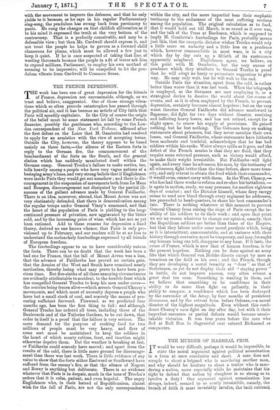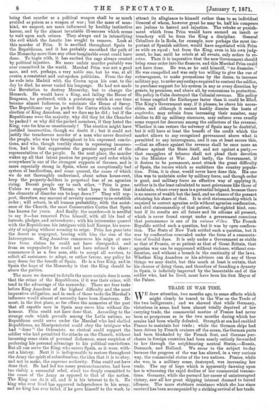THE MURDER OF MARSHAL PRIM.
IT would be very difficult, perhaps it would be impossible, to state the moral argument against political assassination in a form at once conclusive and short. A man does not scruple to shoot a brigand who is murdering another man, and why should he hesitate to shoot a traitor who is mur- dering a nation, more especially while he maintains that his right to defend that nation by slaughter is so strong as to involve a duty ? One argument against assassination has always, indeed, seemed to us nearly irresistible, namely, the breach of faith it must invariably involve, the tacit contract
being that murder as a political weapon shall be as much avoided as poison as a weapon of war ; but the mass of man- kind, we suspect, are more influenced by healthy instinctive horror, and by the almost invariable ill-success which seems to wait upon such crimes. They always end in intensifying the evil which the fanatic has sought to remove. Look at this murder of Prim. It is ascribed throughout Spain to the Republicans, and it has probably smoothed the path of the Monarchy more than any other imaginable event could have done. To begin with, it has excited the rage always created by political injustice. No more unfair murder probably was ever committed in the world. Marshal Prim was not a good man, and not, perhaps, a very noble one, but he was, at all events, a consistent and out-spoken politician. From the day he rode into Madrid with the Crown upon his coat, to the day he died, he never varied his language. He had not made the Revolution to destroy Monarchy, but to change the Monarch. He would have a King, and failing the House of Braganza, he preferred, with a persistency which at one time became almost ludicrous, to nominate the House of Savoy. The Republicans say he packed the Cortes which voted the election of King Amadeus, and we dare say he did ; but if the Republicans were the majority, why did they let the Chamber be packed ? or why did the packed members, if they hated the King, vote for him so unanimously ? The election might have justified insurrection, though we doubt it ; but it could not justify the treacherous murder of a man who never deceived the people, who was true throughout to his expressed convic- tions, and who, though terribly stern in repressing insurrec- tion, had in that suppression the genuine approval of the representatives of the people. In the next place, the murder wakes up all that latent passion for property and order which .everywherels one of the strongest supports of thrones, and is more especially strong in Spain, where an exceptionally bad system of landlordism, and some quarrel, the cause of which we do not thoroughly understand, about urban house-rent, keep the property-holders in perpetual fear of an agrarian rising. Decent people say to each other, " Prim is gone. Unless we support the Throne, what hope is there that the elements of disorder can be kept down ?" They will sup- port, therefore, any amount of severity necessary to re-establish order ; will return, in all human probability, with the assist- ance of the Church, the most Conservative Cortes that Spain has known for years. And finally, the murder—it is needful to say it—has removed Prim himself, with all his load of hatreds, pledges, and antecedents ; with his internecine quarrel with the Republicans, his intrigues with half Europe, his neces- sity of reigning without seeming to reign. Prim has gone into the desert as scapegoat, bearing with him the sins of the Interregnum. King Amadeus commences his reign at once free from claims he could not have disregarded, and from an unpopularity he could not have refused to share ; commences it as a free man, able to accept all services, to solicit all assistance, to adopt, or rather favour, any policy he may deem for the benefit of Spain. He is a free King, and in Spain the hope of the Monarchy is that the King should be above the parties.
The more we descend to details the more certain does it seem that the crime of the Republicans, if it was their crime, will tend to the advantage of the monarchy. There are four tasks before King Amadeus of the highest difficulty and the most imperative obligation, and in each of those tasks the Marshal's influence would almost of necessity have been disastrous. He must, in the first place, so far efface the memories of the past that all capable men in Spain may serve him without dis- honour. Prim could not have done that. According to the strange code which prevails among the Latin nations, no Republican could serve under the Marshal who had shelled Republicans, no Montpensierist could obey the intriguer who had " done "- the Orleanists, no clerical could support the soldier who had permitted the attacks on the Church, without incurring some stain of personal dishonour, some suspicion of preferring his personal advantage to his political convictions. But all can serve the King, who enters Spain, as it were, with- out a history. Next it is indispensable to restore throughout the Army the spirit of subordination, the idea that it is to obey, and not to make, the supreme authority. Prim could not have done that. He had led too many pronunciamentos, had been too visibly a successful rebel, stood too deeply committed to the cause of the Army as opposed to that of the nation. The King can do it all, and it is his interest to do it. No king who ever lived has approved independence in his army, and no king has ever failed, if he gave himself to the work, to
attract its allegiance to himself rather than to an individual General of whom, however great he may be, half his compeers are jealous to hatred and injustice. The rebuke or punish- ment which from Prim would have seemed an insult or treachery will be from the King a discipline. General Caballero de la Reda, for example, now perhaps the most im- portant of Spanish soldiers, would have negotiated with Prim as with an equal ; but from the King, even in his own judg- ment, he has, until he rebels at all events, only orders to re- ceive. Then it is imperative that the new Government should bring some order into the finances, and this Marshal Prim could not have done. He was, as he said himself, " no financier." He was compelled and was only too willing to give the cue of extravagance, to make promotions by the dozen, to increase military pay, to order any outlays required to content the soldier, to purchase support for his system in any or every direction by grants, by promises, and above all, by concessions to protection. His policy in Cuba destroyed the Colonial revenue. His policy at home emptied the Exchequer faster than it could be filled. The King's Government may, if it pleases, be above his neces- sities, and although it cannot hastily dismiss the hosts of empleados, may refrain from increasing their number, may decline to fill up military sinecures, may enforce even cruelly some respect for decorum among the collectors of the revenue. Whether it can restore the solvency of Spain may be doubtful, but it will have at least the benefit of the credit which the market allows to any recognized government above what is permitted to any interregnum, and it can at least secure this, —that an offence against the revenue shall be once more an offence against the State itself, and not against a party,— that smugglers of tobacco shall not plead their devotion to the Minister at War. And lastly, the Government, if it desires to be permanent, must attack the great difficulty of Spain, the tenure which so embitters the country popula- tion. Prim, it is clear, would never have done this. His one idea was to maintain order by military force, and though order is good, and military force an effective way of applying it, neither is in the least calculated to meet grievances like those of Andalusia, where every man is a potential brigand, because there is no source of wealth but the land, and no chance of the peasant obtaining his share of that. It is civil statesmanship which is required to correct agrarian evils without agrarian confiscation, and civil statesmanship of that patient, far-sighted kind, con- tent if its results are all future and its odiums all present, which is never found except under a government conscious that permanence is one of its raisons d'Are. The French Republic settled such a question, but it was by open confisca- tion. The State of New York settled such a question, but it was by confiscation concealed under the form of a commuta- tion of feudal dues. It is only under a Government as stable as that of Prussia, or as patient as that of Great Britain, that agrarian war can be suppressed without violence, without con- fiscation, and without a breach in the continuity of the laws. Whether King Amadeus or his advisers can do any of these things we may doubt, but this much at least is certain, that his chance of doing them, and therefore of founding a dynasty in Spain, is infinitely improved by the lamentable end of the soldier who, had he lived, must have been his first Mayor of the Palace.































 Previous page
Previous page